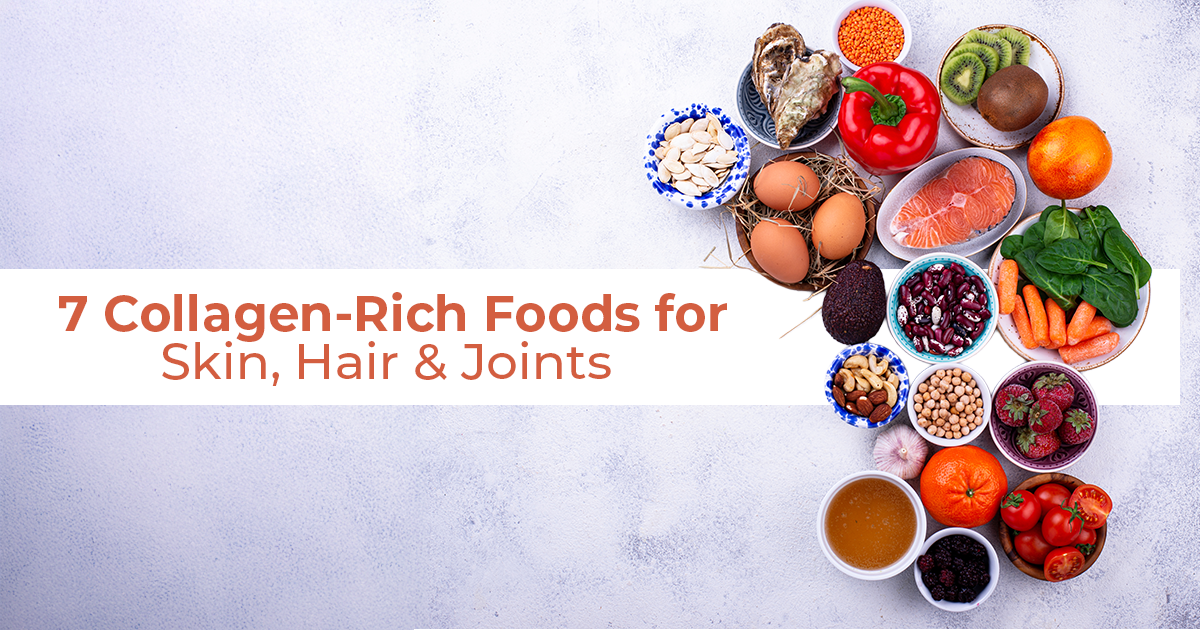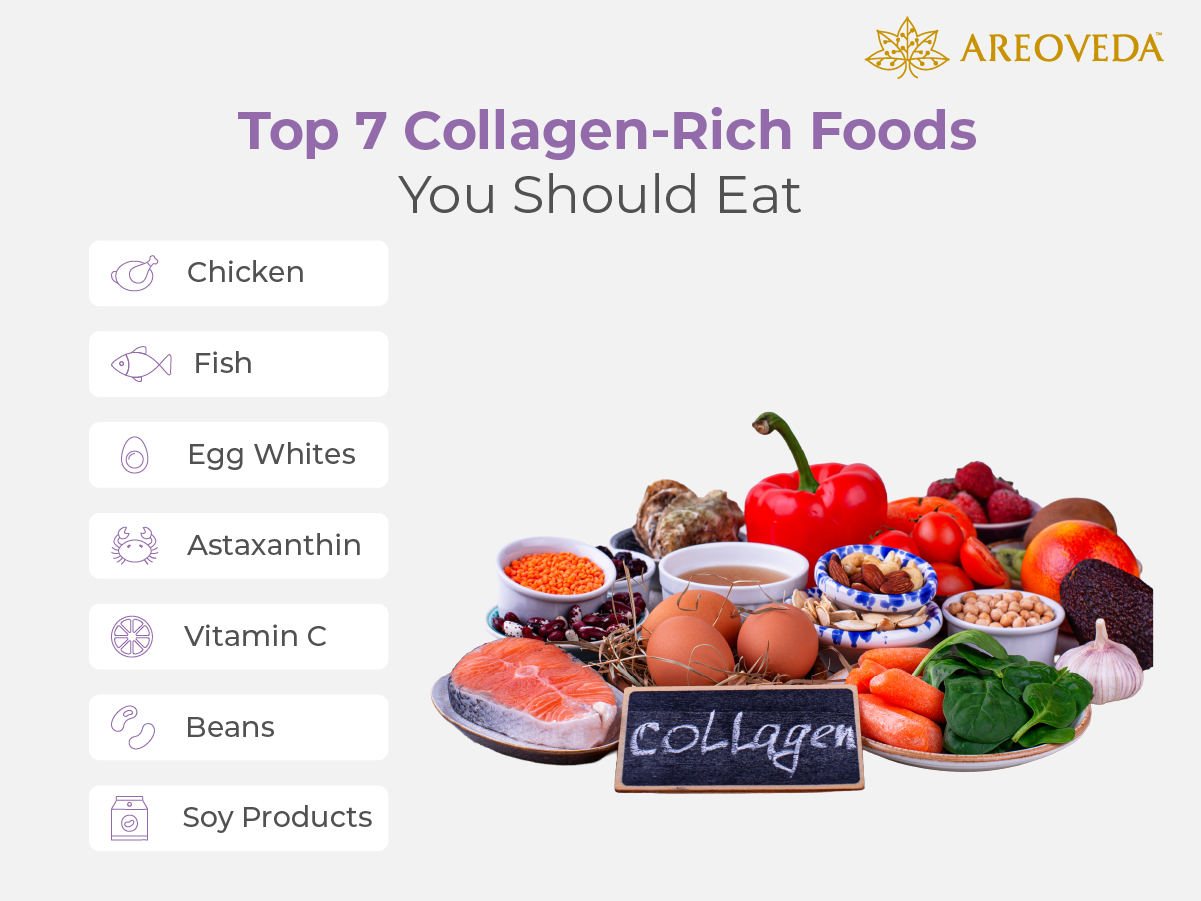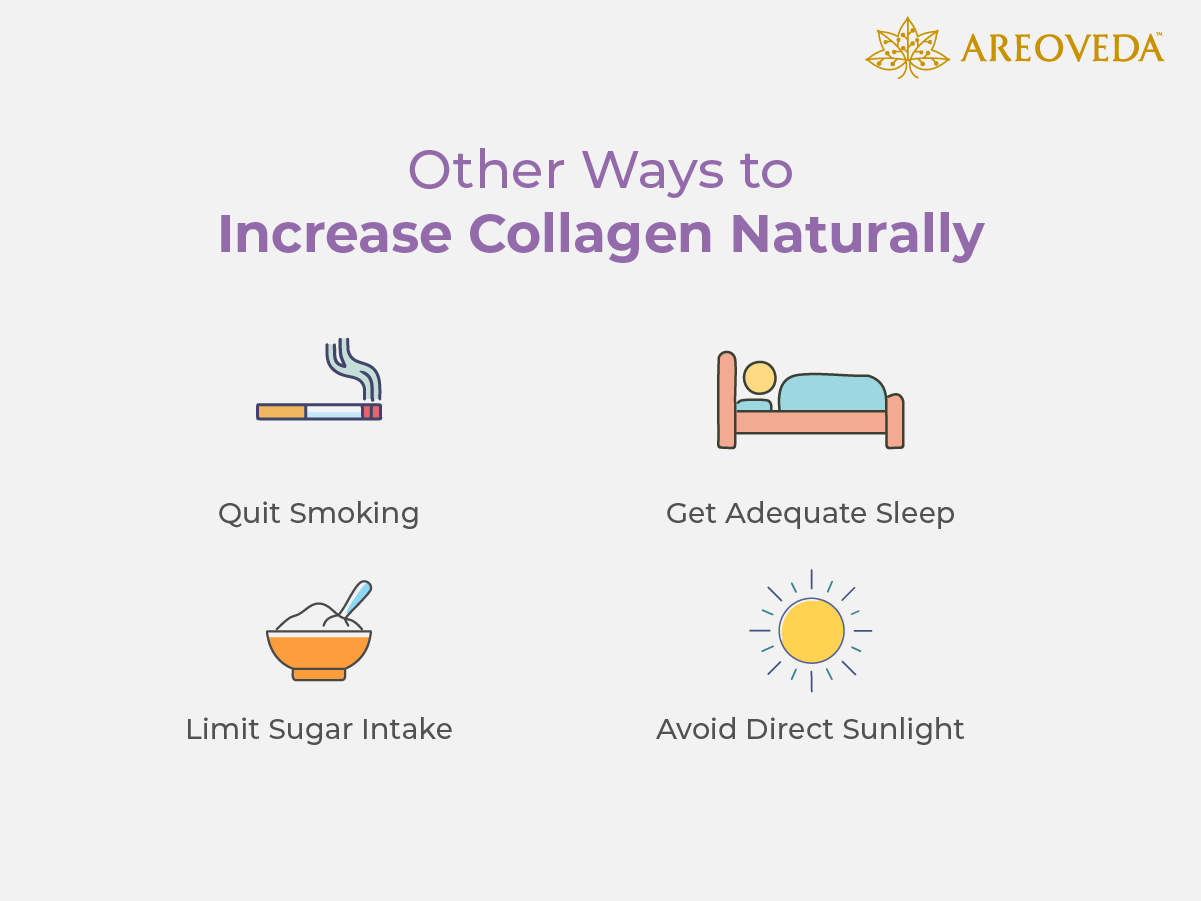
If your bathroom shelf looks like a skincare lab but your glow is still missing, it’s not your fault. The secret to plump skin, shiny hair, and flexible joints might be hiding… right on your plate. Yup, we’re talking about collagen!
It is the protein that helps keep your skin, hair and joints healthy. But as you age, the collagen level starts to dip and that’s when dullness, sagging, and stiff joints begin to show up.1 The good news? You don’t need expensive supplements or powders to fix it. With the right collagen-rich foods, you can naturally support your body’s collagen production and notice real, visible changes over time.
If you’re curious to know exactly what collagen is, how it works, and which foods to add to your diet, keep reading!
Key Takeaways
|
What is Collagen?
Collagen is the most abundant protein in your body that plays a crucial role in supporting the skin, hair, nails, bones, and joints. It is made from amino acids like glycine, proline, and hydroxyproline and is responsible for maintaining the structure of the key areas. 1
In fact, collagen accounts for nearly 30% of your body’s total protein. It helps keep your skin smooth, your hair healthy, and your joints flexible and strong.1
Types of Collagen
Did you know that your body produces different types of collagen? Out of them, 3 types play the most important roles, which include:1
- Type I: Makes 90% of your body’s collagen. It’s found in skin, bones, tendons, and ligaments
- Type II – Supports cartilage and joints.
- Type III – Present in arteries, organs, and muscles.
So, how can you give your body the collagen it needs? Let’s find out through some foods that naturally boost it.
Top 7 Collagen-Rich Foods You Should Eat

In the first place, collagen-rich foods are those that either contain collagen directly or help your body make more of it. They’re loaded with amino acids, vitamins, and minerals that support healthy skin, hair, and joints. These foods can come from both animal and plant sources. Let’s take a closer look at each of them.2 3
1. Chicken
Chicken is one of the most common animal sources of collagen and for good reason. It’s naturally rich in connective tissues, which are packed with this protein. That’s why many collagen supplements are made from chicken bone. Studies have even shown that collagen extracted from chicken bones and cartilage may help reduce skin inflammation and support joint health.4
2. Fish
Fish is another natural source of collagen. The skin, bones, and ligaments of fish are packed with it. The best thing? Marine collagen is said to absorb better than other forms. Studies also link it to improved skin elasticity and hydration, making it one of the best collagen-rich foods to include in your diet for glowing, youthful skin.4
3. Egg Whites
Egg whites are not packed with a large amount of connective tissue, like other animal sources of collagen. But they are rich in proline - one of the key amino acids your body needs to make collagen. So, while they don’t contain collagen directly, they definitely support your body’s natural collagen production. That makes eggs a simple and affordable addition to your list of collagen-rich foods.5
4. Astaxanthin
Astaxanthin is a natural antioxidant found in seafood such as salmon, shrimp, and certain types of algae. It’s known for its ability to protect the skin from oxidative stress, one of the main reasons for collagen breakdown.6
Astaxanthin is also packed with antioxidants that may improve skin elasticity, reduce wrinkles, and support collagen maintenance by protecting collagen fibres from damage.7 So, the next time you plan your meals, try including collagen-rich seafood.
5. Vitamin C
Vitamin C, also called L-ascorbic acid, is a water-soluble vitamin that your body can’t make on its own. That means you need to get it from your diet.8
The best sources include citrus fruits, guava, red peppers, oranges and grapefruits. Vitamin C is a strong antioxidant that supports your skin’s natural functions.8 It helps your body produce collagen and fights harmful free radicals, which can slow down skin aging.8 9
6. Beans
Beans are a quiet powerhouse when it comes to collagen support. They’re loaded with protein and contain lysine (an amino acid your body needs to make collagen). Additionally, the bonus part is that beans are rich in copper, which also plays a role in maintaining steady collagen production. This means you need to add more beans to fuel your body for healthy skin and stronger joints.10
7. Soy Products
Soy is one of those simple foods that quietly does wonders for your skin. It’s packed with a compound called genistein, which helps the body make more collagen and keeps the skin firm and elastic. Regularly consuming soy products such as tofu, soy-based milk, or edamame can even slow down signs of aging, like fine lines and wrinkles.11 12
Possible Side Effects of Collagen-Rich Foods
For most people, collagen-rich foods are safe and actually good for their skin, joints, and overall health. But as with anything in your diet, balance matters. For instance:
- If you consume a lot of animal-based sources with bone broth, chicken with skin and cartilage, or meat cuts, it may increase your intake of saturated fats or sodium, which can put strain on your heart over time. That’s why it’s important to balance them with veggies, fruits, and fibre to keep your health in check.13
- If you’re allergic to fish, shellfish, or eggs, it’s better to stay cautious. These are collagen-rich foods, but they can also trigger allergic reactions like skin irritation or other health issues. So, before you consume packaged foods, always check the label for allergens. Also if you’re unsure, it’s best to consult a doctor.13
Other Ways to Increase Collagen Naturally

Eating collagen-rich foods is just one part of improving collagen levels. Apart from that, daily lifestyle habits also influence the body’s collagen production. So let’s take a look at how you can improve collagen production naturally:
1. Quit Smoking
Smoking is one of the main reasons for the declining collagen levels. It damages the proteins that keep your skin firm and smooth. The nicotine content in it also reduces blood flow, which lessens oxygen and nutrients in the body. Over time, this leads to dull, tired-looking skin and faster ageing. So if you want healthy skin, quit smoking.1
2. Limit Sugar Intake
Eating too much sugar and refined carbs can harm your skin in many ways. Excess sugar binds to proteins in your body through a process called glycation, forming harmful compounds that break down collagen. This makes your skin weaker, drier, and less elastic over time. That’s why it’s best to limit foods high in sugar in your diet.1
3. Avoid Direct Sunlight
Spending too much time in the sun can also break down collagen production. This can lead to wrinkles and early signs of aging. To keep your skin healthy, limit long run sun exposure and always apply a broad-spectrum sunscreen with SPF 30 or higher.1
4. Get Adequate Sleep
Collagen keeps the skin firm and healthy. But as one ages, collagen naturally starts to decline due to stress. Not just that, even lack of sleep speeds up this process, making the skin age faster. So getting adequate and quality sleep can support your body’s natural collagen production.14
So, collagen doesn’t increase from foods alone, it also benefits from healthy lifestyle choices. Combine these tips with collagen-rich foods to keep your skin, hair, and joints healthy and strong.
Final Thoughts!
Adding collagen-rich foods to your diet is a simple, natural way to support healthy skin, hair, and joints. While many collagen supplements exist, whole foods provide additional nutrients that work together to boost overall wellness.
Also to maximise the benefits, pair collagen-rich foods with proper hydration, balanced meals, and healthy lifestyle habits. Soon you’ll notice your skin looking firmer, hair stronger, and body healthier, naturally.








